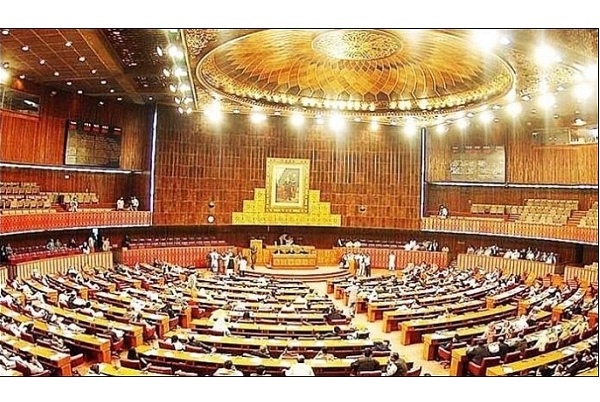KARACHI: Pakistan Stock Exchange above the 98,000 mark on Friday as share prices surged more than 2,000 points in intraday trade
ISLAMABAD: The government clarified that the campaign to be launched under the banner of Azm-i-Istehkam would not be a kinetic large-scale military operation, nor would it entail the mass displacement of the local population.
The clarification came apparently in the wake of intense opposition criticism of the government’s plans to launch military action, ostensibly to safeguard against the rising threat of terrorist violence, without consulting parliament.
The plans for a reinvigorated and re-energised national counter-terrorism campaign, which were announced on Saturday, entailed augmenting the kinetic efforts of the armed forces with support from all law enforcement agencies, as well as effective legislation to address legal voids that hinder effective prosecution of terrorism-related cases.
But this was met by full throated criticism from opposition parties, including the PTI, JUI-Fazl and ANP — both inside parliament and outside — with the KP chief minister even denying that any such thing was discussed with him during the apex committee meeting last week.
In an apparent response to these misgivings, the statement issued by the PM Office pointed out that “previous kinetic operations were conducted to physically dislodge terrorists from their known locations which [became] no-go areas and compromised the writ of the state. These operations required mass displacement of the local population and systematic clearance of affected areas”.
As there are no such areas in the country any more and terrorists’ ability to carry out large-scale organised operations inside Pakistan had been “decisively degraded by earlier kinetic operations… no large-scale military operation is being contemplated where displacement of population will be required,” the statement said.
Azm-i-Istehkam was a “multi-domain, multi-agency, whole of the system national vision” for enduring stability in Pakistan, it said.
“It is meant to reinvigorate and re-energise the ongoing implementation of Revised National Action Plan, which was initiated after the national consensus across the political spectrum,” the statement said, adding that the proposed operation would “energise” intelligence-based operations to “decisively root out” terrorists, the crime-terror nexus, and violent extremism.
During the National Assembly session on Sunday, opposition parties such as the Jamiat Ulema-i-Islam (JUI-F) and the Awami National Party (ANP) joined the chorus opposing the proposed operation, with the former saying such a move would further deteriorate the volatile situation in bordering regions.
In a press conference in Quetta earlier in the day, JUI-F chief Maulana Fazl alluded to the plan to conduct the operation, saying the decision of the apex committee would make the country “weak”.
“The decisions made by individuals in the apex committee are weakening the country as at every level the uniformed people are sitting in the apex committees,” he said, claiming that Prime Minister Shehbaz Sharif did not have the power to take decisions.
Similar concerns were expressed by the ANP, which said that they would not support the move unless their reservations were addressed. In a statement issued by Khyber Pakhtunkhwa president Mian Iftikhar Hussain, the ANP said that the National Assembly, the Senate and the stakeholders should be taken on board.
The statement also asked on whose directions had a former intelligence chief held negotiations with militants. Mian Iftikhar stated that the situation had reached a point where people “do not believe in negotiations as well as operations against militants anymore”.
After negotiations, the militants took over and people became displaced and it was the same situation after military operations, it added.
He stated that only one point of the National Action Plan, the military courts, was implemented and questioned why were the rest of the 19 points not implemented.
“The militants’ masterminds are in Punjab which was mentioned in the National Action Plan. There are 70 banned organisations which resurfaced with different names. If [you need] to start [an operation], start from them,” the statement said, adding that there were reports about the military operation to be launched against militants in Upper Dir and Lower Dir districts.
Defence Minister Khawaja Asif, who defended the move during the National Assembly session on Sunday, said that the matter would be tabled before parliament in an in-camera session.
He said the outcome of the cabinet meeting on Saturday was not final and “it will go through the cabinet then it will be presented in the House and the House would be briefed”.
You May Also Like
TEHRAN: The head of Iran’s Revolutionary Guards described the arrest warrant issued by the International Criminal Court for Israeli Prime
LOWER KURRAM: The death toll in yesterday’s gun attack on passenger vans in Khyber Pakhtunkhwa’s Lower Kurram has risen to 42,






